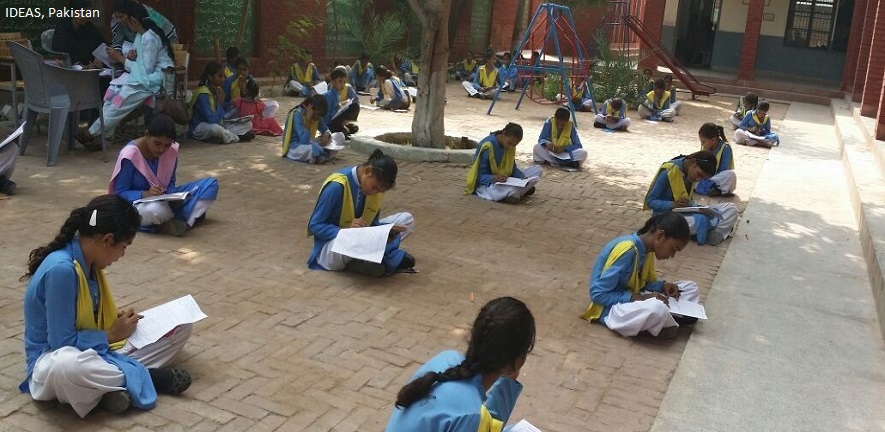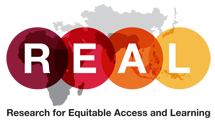
Teaching Effectively All Children (TEACh): India and Pakistan
Project summary
Governments across the world recognise the importance of providing an education to all children within an inclusive education system. Yet, despite great progress in getting more children into school over the past decade, children from disadvantaged backgrounds are likely to experience poor quality of education, limiting chances of fulfilling their learning potential. Children who face multiple disadvantages related to disability, poverty, gender, caste, religion or where they live, are amongst those least likely to be learning.
This project aims to identify which aspects of teaching are most important for improving all children's learning, and so inform governments on the strategies needed to support children who face multiple disadvantages. The research is being conducted in India and Pakistan, countries characteristic of other poor countries in terms of wide learning inequalities. India shows some advances in identifying strategies to tackle disadvantage, while Pakistan is similar to many other low-income countries in not yet having such strategies.
Recognising that limited information is available on learning levels of children facing different forms of disadvantages who are not in school, the research assesses children both in the household and in schools. The focus of these tests is on achievement of foundational skills of reading, writing, reasoning and numeracy that children are expected to acquire in primary school. This is being followed up with a test at the end of the school year in order to identify what learning gains have been made, and the extent to which these gains can be attributed to particular teacher characteristics, or other factors such as family background. The research further provides an in-depth understanding of the problems that teachers face in supporting students from diverse backgrounds within the classroom, the teaching practices they adopt, and the kinds of support they need in order to make sure they are able to help all children fulfill their learning potential.
This research aims to contribute to debates about the future of global goals on education after 2015, which are focusing on raising learning outcomes in ways that make sure no one is left behind. Achieving these goals will require better identification of the characteristics of children not learning, and the implementation of strategies within countries to strengthen the effectiveness of teaching in ways that address diversity in the classroom.
Research instruments
View the TEACh Research Instruments.
Research team
Principal Investigator: Professor Pauline Rose
Co-Investigators: Professor Nidhi Singal; Professor Anna Vignoles
Research Associate: Dr Lydia Whitaker
Associated Researchers: Dr Monazza Aslam, Institute of Education/University of Oxford; Dr Shenila Rawal, Institute of Education
Country Partners: Collaborative Research and Dissemination (CORD), India and Institute of Development and Economic Alternatives (IDEAS), Pakistan
Duration
July 2015 - October 2018
Funder
Economic and Social Research Council (ESRC) – Foreign, Commonwealth and Development Office (FCDO) Raising Learning Outcomes in Effective Education Systems programme
Publications
Improving learning outcomes in schools understanding the challenge of quality in the Indian context
Book edited By Varghese, N. V., Sarup, V., De, A. and Sinha, A. Routledge. October 2025
With chapter from De, A. and Samson, M.: Challenges to improve learning levels of all children in government primary schools in rural Haryana.
School enrolment and learning outcomes for children with disabilities: findings from a household survey in Pakistan
Singal, N., Sabates Aysa, R., Aslam, M. and Saeed, S. 2020
International Journal of Inclusive Education
Education of children with disabilities in rural Indian government schools: A long road to inclusion
Taneja-Johansson, S., Singal, N. and Samson, M. May 2021
International Journal of Disability, Development and Education
Social distance, teachers’ beliefs and teaching practices in a context of social disadvantage
De, A. and Malik, R. March 2021. Chapter 12 (Open Access) in 'Reforming education and challenging inequalities in Southern contexts: Research and policy in international development. A tribute to Christopher Colclough' (Eds.) Rose, P., Arnot, M., Jeffery, R. and Singal, N. Routledge Series: Education, Poverty and International Development, 2021
Are children with disabilities in school and learning? Evidence from a household survey in rural Punjab, Pakistan
Malik, R., Raza, F., Rose, P. and Singal N. 2020
Compare: A Journal of Comparative and International Education DOI:10.1080/03057925.2020.1749993
Do government schools improve learning for poor students? Evidence from rural Pakistan
Aslam, M., Malik, R., Rawal, S., Rose, P. and Vignoles, A. 2019
Oxford Review of Education, 45 (6)
Research on children with disabilities influences education policy in Pakistan
Tofaris, E., Bari, F. and Malik, R.
The Impact Initiative impact story, May 2019
Methodological lessons on measuring quality teaching in Southern contexts, with a focus on India and Pakistan
Aslam, M., Malik, R., Rawal, S., Rose, P., Vignoles, A. and Whitaker, L. 2018
Research in Comparative and International Education, 14 (1)
Identifying disability in household surveys: Evidence on education access and learning for children with disabilities in Pakistan
Bari, F., Malik, R., Rose, P. and Singal, N. 2018
Research and Policy Paper No. 18/1
Strengthening teaching for children with disabilities: India and Pakistan
Rose, P. 2017
In Disability and Education, The Impact Initiative
Teacher politics: Meeting educational quality challenges with teachers
Aslam, M., Asadullah, N. and Kingdon, G. 2016
Background Paper for The Learning Generation, Education Commission
Blogs
Challenges and opportunities for Pakistan education systems in the COVID-19 response
Rabea Malik, UKFIET Blog, 1 June 2020
Disability and data: Need for numbers and narratives
Nidhi Singal, Washington Group on Disability Statistics, 22 August 2019
Disability data for effective policy design: reflections from the TEACh project in Pakistan
Nidhi Singal and Rabea Malik, Washington Disability Group on Disability Statistics, 22 August 2019
New research addresses global teaching crisis
Elizabeth Tofaris, UKFIET, 21 November 2018
Global Disability Summit 2018 – Committing to better data and evidence
Pauline Rose, RISE Programme, 31 July 2018
Supporting learner diversity in government schools in Pakistan
Matt Somerville, UKFIET Conference, 27 November 2017
The missing voice of teachers: Evidence from Pakistan
Fizza Raza, UKFIET Conference, 1 November 2017
The stabilizing power of school for children with disabilities in Pakistan
Faisal Bari, Open Society Foundations, 4 January 2017
Managing diversity
Faisal Bari, Dawn, 2 December 2016
The paradox of disability and education in India
Anuradha De and Nidhi Singal, The Impact Initiative, August 2016
Understanding and responding to disadvantage in education
Rabea Malik, Pakistan's Growth Story, 11 December 2016
Who learns and who does not? Examining choices for including the excluded Baela Raza Jamil, Education Commission, 2 December 2016
1, 2, 3 testing: Assessing learning of what, for what, and for whom? Pauline Rose, Global Partnership for Education, 30 November 2016
Education's missing priorities
Rabea Malik, Dawn, 17 September 2016
Teaching, learning and disadvantage: from policy to practice
Meera Samson and Pauline Rose, The Impact Initiative, August 2016
Access and learning are equally important for children with disabilities
Nidhi Singal and Ricardo Sabates, Global Partnership for Education, 27 January 2016
Other media
REAL Centre evidence in International Development Committee's report on Education
Faculty of Eduation News (PDF), 28 April 2017
UN says 69 million teachers needed for global school pledge
BBC News, 4 October 2016
Education that adds up
University of Cambridge Research Horizons (PDF version), 16 October 2015
Citizens re-shaping education through evidence-based annual learning accountability initiatives in Pakistan and beyond: Video and Audio University of Cambridge, June 2014
Further information
See UK Research and Innovation (UKRI) Gateway to Research (GtR) project page: Learning outcomes and teacher effectiveness for children facing multiple disadvantages, including those with disabilities: India and Pakistan

